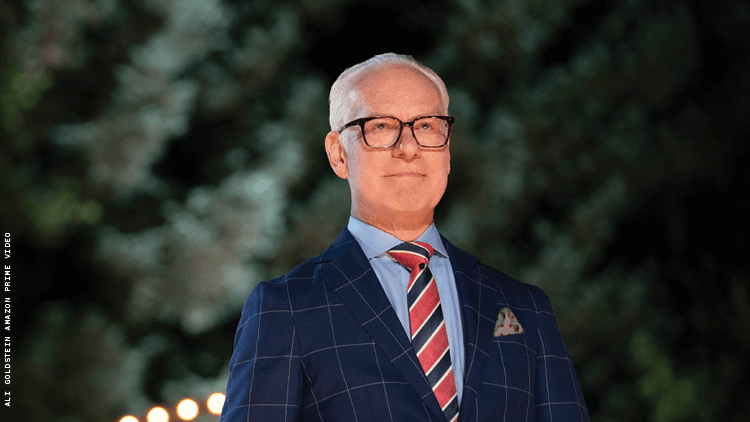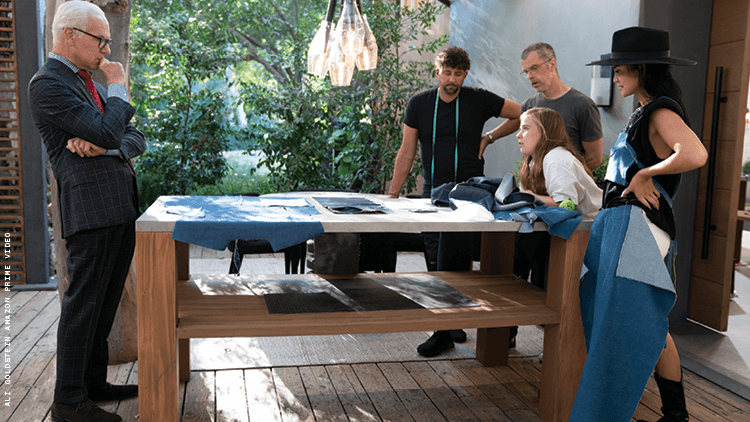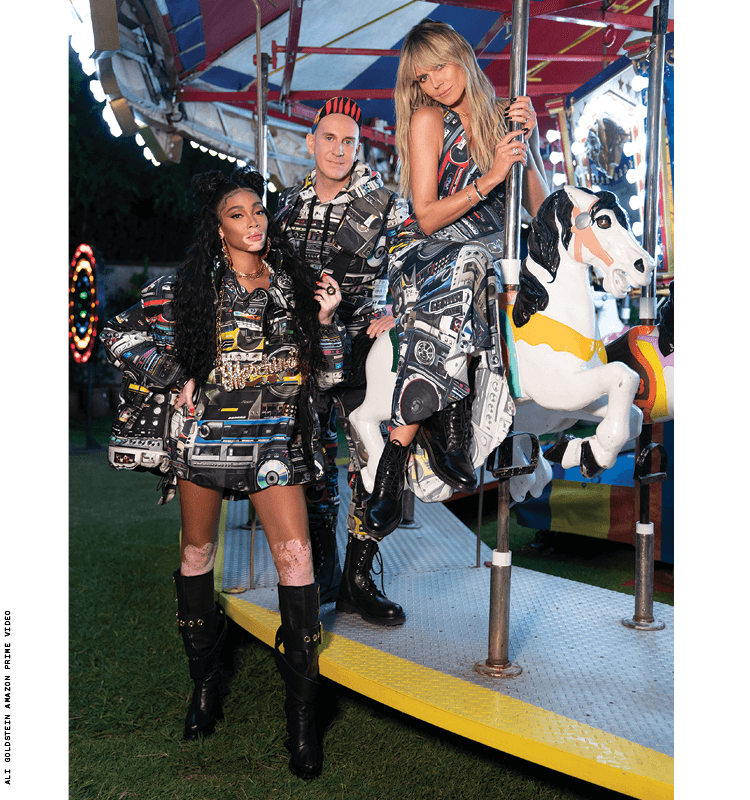The pandemic threw the sartorial rulebook out the window, says the style guru. And maybe that’s a good thing.
Fashiontim gunnTVTelevisionEntertainment Daniel Reynolds
Daniel ReynoldsTim Gunn has a confession. He wore sweatpants during lockdown.
“The rumor is true,” admits the gay style guru, known for his impeccably tailored suits. “It was a slow evolution, but I got there.”
“I now have great respect for people who say, ‘I’m dressing for comfort.’ I get it,” he adds. “I used to have disdain for these people and say, ‘That’s ridiculous. Who cares about comfort? If I want comfort, I’ll stay in bed.’ And then sitting at home for months, I thought, ‘Why am I constraining myself and my rib cage and everything else? I want to relax.’”
Like many folks, Gunn modified his relationship with clothes — and the rules surrounding them — in order to adjust to a socially distanced, work-from-home world. In addition to sweats, which he historically only wore during fencing practice, Gunn donned T-shirts and baggy jeans around his residence. There were some concessions. When descending to the lobby to retrieve mail, he still eschewed the suit but slipped on a turtleneck and “a better pair of jeans” for appearances.
Zooming from New York during a virtual press junket, Gunn is once again donning a dapper suit and tie. “I love it, I really do,” he admits of his signature look. But the experience of dressing down during the pandemic has left an indelible impression upon one of style’s great influencers. “I’ve definitely changed the rules,” he says, adding, “I admit to being a stuffed shirt, but I don’t have to be as stuffy.”
Even on Making the Cut— the Amazon Prime Video reality competition he cocreated and co-hosts with his fellow Project Runway alumnus, Heidi Klum, in which designers vie for a $1 million investment prize and a fashion line with Amazon’s e-commerce platform — Gunn is seen relaxing his guidelines. He wears jeans in an episode of season 2, albeit for a Levi’s challenge.
Of course, the production itself, which filmed during the pandemic, was forced to tailor many adjustments as well. The travel aspect of Making the Cut— the first season flitted from Paris, to Tokyo, to New York City — was traded for largely outdoor locales at a Malibu ranch. Instead of the Eiffel Tower as a backdrop, models strut en pleinair past trees dripping in lights, a field with a Ferris wheel, the surface of a pool.

Tim Gunn counsels the designers.
And now, the judges — season 2 boasts Moschino’s creative director, Jeremy Scott, and supermodel Winnie Harlow, as well as guest judges Prabal Gurung and Shiona Turini — have the daunting task of selecting a designer who will appeal to a global audience in a time when all fashion sense has been thrown out the window.
“I really feel that we’re entering a state of anarchy, in a manner of speaking,” Gunn says. “And I do agree, I don’t think there are any rules when it comes to fashion anymore.”
“However,” he adds with a pointed emphasis and a laugh, “I do think people should take responsibility for how they present themselves to the world. I mean, it’s the semiotics of clothes. The clothes we wear send a message about how we’re perceived. Accept responsibility for that. Don’t say, ‘Oh, I don’t care how I dress.’ Really? Well, if you don’t, you should. That’s all that I ask.”
In a possible boon, however, the absence of rules has created more space for people, like members of the LGBTQ+ community, who have always broken them. And some of the past year’s biggest sartorial headlines have been related to public figures who defied the gender binary: Lil Nas X wearing a ballgown to the 2021 BET Awards, and in November 2020, Harry Styles sporting a tulle skirt and a dress in the pages of Vogue. These clothes ruffled right-wing feathers. In response to the Styles shoot, conservative commentator Candace Owens slammed“the steady feminization of our men,” calling it “an outright attack” on social mores in a stream of tweets. “Bring back manly men,” she implored.

Heidi Klum goes sidesaddle with judges Jeremy Scott and Winnie Harlow.
Gunn knows that the outrage over men in dresses is a relatively recent development in fashion history. “Pants are a creation of the middle of the 19th century, relatively new,” confirms Gunn, who points out the previous long-term male trends of skirts, pantaloons, and leggings. The backlash to Styles was “so ridiculous. And I thought he looked fabulous,” Gunn says. He also gives high praise to Lil Nas X, who he described as “music’s Billy Porter,” referring, of course, to the Pose star who often upends gender expectations on red carpets. “You know what’s wonderful about [Lil Nas X], he feels fresh and original. He doesn’t feel like a copycat,” Gunn lauds.
Gunn also believes there is “definitely a correlation” between the visibility of clothing that pushes back against the gender binary and the spike in anti-LGBTQ+ bills sweeping the United States, many of which target transgender and nonbinary people. “I think the more of this [fashion] that we see, the more pushback we’re going to get. And I think it’s fear-based,” Gunn says.
But there is necessity in visibility. Gunn sees an act of gender-nonconforming dress as an intent to declare, “There are other options in the world, and we’re here to say that we’re proud of them.”
Defying the binary is also a central part of Making the Cut, where, in both seasons, designers have interchanged models of different genders to display their art. “It’s a beautiful demonstration of this new world,” says Gunn, who believes his designers exemplify what it means to succeed in the fashion industry’s post-pandemic frontier. “They realize how important having a voice is, speaking metaphorically, really. How important it is to have a point of view, and to be able to differentiate yourself from everyone else.”
In addition to inspiring the fashion world, Gunn hopes that Making the Cut’s international platform can galvanize greater acceptance toward LGBTQ+ people — in particular, those who push against gender norms. “I hope it plants a seed that grows into something very positive and something that can break down barriers and reduce people’s fears and apprehensions,” he says.
And while there was much suffering caused by the pandemic, Gunn sees reason to hope that this planet-changing event might spark positive change in the spheres of fashion, politics, and beyond. “I don’t believe things can be the same… and I don’t think things should be the same,” he says. “This is nothing but an opportunity for fresh points of view and new parameters.”
This feature story is part of Out's 2021 Fashion Issue. The issue is out on newsstands on August 16, 2021. To get your own copy directly, support queer media and subscribe — or download yours for Amazon, Kindle, Nook, or Apple News. And don't miss Amazon Prime Video's Making the Cut finale on Friday, August 6.
0Making the Cut's Tim Gunn on Fashion’s 'State of Anarchy'
0
